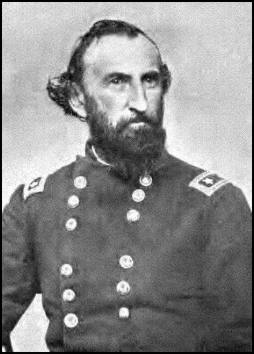
John Alexander McClernand (1812-1900)
John Alexander McClernand (May 30, 1812 September 20, 1900) was an American soldier and lawyer.
McClernand was born in Breckinridge County, Kentucky. He was admitted to the bar in Shawneetown, Illinois, on May 30, 1832; in the same year served as a volunteer in the Blackhawk War, and in 1835 founded the Shawneetown Democrat, which he thereafter edited. 
He served as a Democrat in 1836 and in 1840-1843 in the Illinois House of Representatives, and in 1843-1851 and in 1859-1861 was a representative in Congress, where in his first term he vigorously opposed the Wilmot Proviso, but in his second term was a strong Unionist and introduced the resolution of the July 15, 1861, pledging money and men to the national government.
He resigned from Congress, raised in Illinois the McClernand Brigade, and was commissioned (May 17, 1861) brigadier general of volunteers. He was second in command at the battle of Belmont (Missouri) in November 1861, and commanded the right wing at Fort Donelson. On the March 21 he became a major general of volunteers. At Shiloh he commanded a division which was practically a reserve to Sherman's.
In October 1862 Edwin Stanton, secretary of war, ordered him north to raise troops for the expedition against Vicksburg; and early in January 1863, at Milliken's Bend, McClernand, who had been placed in command of one of the four corps of Ulysses S. Grant's army, superseded Sherman as the leader of the force that was to move down the Mississippi. On the January 11, 1863, he took Arkansas Post. On the January 17, Grant, after receiving the opinion of Admiral Andrew H. Foote and General Sherman that McClernand was unfit, united a part of his own troops with those of McClernand and assumed command in person, and three days later ordered McClernand back to Millikens Bend. During the rest of this Vicksburg campaign there was much friction between McClernand and his colleagues; he undoubtedly intrigued for the removal of Grant; it was Grant's opinion that at Champion Hill (May 16, 1863) he was dilatory; and because a congratulatory order to his corps was published in the press (contrary to an order of the department and another of Grant) he was relieved of his command on June 18, and was replaced by General E. O. C. Ord.
President Abraham Lincoln, who saw the importance of conciliating a leader of the Illinois War Democrats, restored him to his command in 1864. In January of 1864, he was re-appointed to command of the 8th Corps in the Red River campaign. However, on November 30, 1864 he resigned his commission due to malaria and returned to Springfield, Illinois.
Although General McClernand was not popular amongst his peers, there can be little doubt that McClernand's enthusiasm was essential in rallying Union support from Southern Illinois.
After the war, McClernand practiced law in Illinois. In 1870, he was elected to the circuit court and served on the bench for 3 years (1870-1873). He stayed politically active, presiding at the 1876 Democratic National Convention in St. Louis, Missouri, which nominated Samuel J. Tilden to run for president against Rutherford B. Hayes.
McClernand died on September 20, 1900 in Springfield, Illinois, and is buried in the Oak Ridge Cemetery.